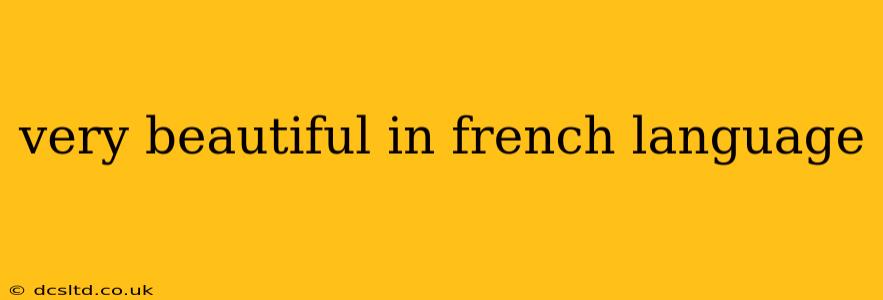Very Beautiful in French: Exploring Nuances of Beauty
The French language, renowned for its elegance and expressiveness, offers a rich tapestry of ways to express "very beautiful." A simple translation misses the subtle differences in connotation and context. Choosing the right phrase depends on what kind of beauty you're describing – the beauty of a person, a landscape, a work of art, or an abstract concept.
This article explores various ways to say "very beautiful" in French, delving into their nuances and helping you select the perfect expression for your intended meaning.
How do you say "very beautiful" in French?
The most straightforward translation of "very beautiful" is très beau/belle (masculine/feminine). However, French offers far more nuanced expressions. The choice depends on the object of your admiration and the intensity of your feeling.
-
Très beau/belle: This is the most common and versatile option. It's suitable for most situations and works well for describing the beauty of people, objects, or places. Example: La peinture est très belle. (The painting is very beautiful.)
-
Magnifique: This word conveys a sense of grandeur and splendor. It suggests something awe-inspiring and breathtaking. Example: Le château est magnifique. (The castle is magnificent.)
-
Splendide: Similar to "magnifique," but perhaps with a slightly more refined and elegant connotation. It suggests a dazzling and impressive beauty. Example: Le coucher de soleil était splendide. (The sunset was splendid.)
-
Sublime: This word suggests a beauty that transcends the ordinary, evoking feelings of awe and wonder. It's often used to describe something exceptionally beautiful and inspiring. Example: La vue est sublime. (The view is sublime.)
-
Superbe: This implies a striking and impressive beauty, often with an element of grandeur or magnificence. Example: Elle est superbe en robe rouge. (She looks superb in a red dress.)
-
Éblouissant/Éblouissante: This means "dazzling" or "stunning," suggesting a beauty that is so bright and intense it almost blinds. Example: Son sourire est éblouissant. (Her smile is dazzling.)
What are some other ways to express intense beauty in French?
Beyond single words, you can amplify the expression of beauty using adverbs and descriptive phrases.
- D'une beauté extraordinaire: (Of extraordinary beauty)
- D'une beauté exceptionnelle: (Of exceptional beauty)
- Une beauté à couper le souffle: (A breathtaking beauty) – Literally "a beauty to cut the breath."
- Incroyablement beau/belle: (Incredibly beautiful)
What's the difference between "beau" and "belle"?
The words "beau" and "belle" are masculine and feminine forms of the adjective "beautiful," respectively. You must match the gender of the noun you're describing. For example:
- Beau garçon: (Handsome boy)
- Belle fille: (Beautiful girl)
- Beau paysage: (Beautiful landscape)
- Belle voiture: (Beautiful car)
How can I choose the best word to describe something beautiful in French?
The best word to use depends heavily on context. Consider the following:
- The object of your admiration: Is it a person, a landscape, a work of art, or something else?
- The intensity of the beauty: Is it simply pretty, or is it breathtaking?
- The overall tone: Do you want to sound formal or informal, elegant or casual?
Experiment with different words and phrases to find the one that best captures the specific beauty you want to express.
This exploration of French words for "very beautiful" provides a starting point for more nuanced expression. The richness of the language allows for a far more expressive description of beauty than a simple translation can convey. Remember to consider the context and your desired level of intensity when making your choice.
